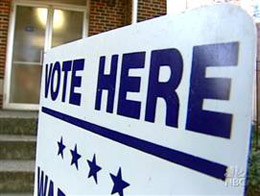 |
 |
 |
 News from Around the Americas | June 2005 News from Around the Americas | June 2005  
Hispanic Voter Surge Predicted
 Steven Thomma Steven Thomma


| | A study predicted that immigration and a higher birth rate among Hispanic women could show up at the polls in the coming years. |
Washington - A Hispanic baby boom could surge into American politics in the next few years, adding to the growing political clout of the nation's largest minority group, a new study predicted Monday.

Two demographic trends are merging to produce the boom - immigration and a higher birth rate among Hispanic women than the rest of the population. Of America's entire population growth from 2000 to 2004, about 5.7 million people - or half the total - were Hispanics. Of them, one-third weren't yet old enough to vote.

Whether they vote, and which party they vote for, remains to be seen. But the fact that they are part of the fastest-growing population group in the country suggests that they could change U.S. politics even if only a fraction participates - provided they tilt decisively to one party in a nation still fairly evenly split between Democrats and Republicans.

"It really is a baby boom," said Richard Fry, one author of the analysis for the Pew Hispanic Center, a nonpartisan research organization that studied new census data as well as 2004 and 2000 election surveys. "These babies will become voters two and three election cycles from now."

RISING INFLUENCE

The promise of Hispanic votes already has changed the way politics sounds and works. President Bush speaks Spanish, he weighs whether to nominate his friend and attorney general, Alberto Gonzalez, to be the first Hispanic on the Supreme Court, and both presidential campaigns mounted ads in Spanish last year.

The prospect of a Hispanic baby boom politically up for grabs will only attract more courting - and clout - as the group ages. The Hispanic population grew so fast from 2000 to 2004 that the Hispanic share of the total 2004 vote went up even though Hispanics still vote at lower rates than non-Hispanic whites or blacks.

PAST OBSTACLES

One factor that restrained the growth of Hispanic voting was that about two-thirds of the new population couldn't vote, either because they weren't citizens or were too young. One-third were younger than 18 on Election Day 2004. Of them, about 1 in 5 will be old enough to vote in 2008, Fry said. Most of the rest will be eligible by 2012.

"Most are native-born U.S. citizens and hence will eventually become eligible voters," the report said. "And when they do, they will join the electorate at a rapid rate."

If this boom does start showing up at the polls - past predictions of Hispanic voting surges have failed to materialize - it isn't a sure vote for either party. The Hispanic vote overall is increasingly open to persuasion.

Pew authors said they thought Bush received about 40 percent of the Hispanic vote in 2004. That would be less than the 44 percent for the president that election-night polls of voters suggested, but still more than the 34 percent Bush received in 2000.

Religion was a major reason that Bush got more votes from Hispanics in his reelection, but not simply because of his aggressive outreach efforts to Roman Catholics, as many assume. In fact, Bush did the same among Hispanic Catholics in 2004 as he did in 2000, the Pew study found.

But Hispanic Protestants increased their share of the total Hispanic vote to 32 percent from 25 percent in 2000. And 56 percent of them voted for Bush, up from 44 percent in 2000. Pew couldn't determine whether that stems from factors unique to the 2004 election, such as the gay-marriage issue, or whether it will persist in 2008 and beyond. | 
 | |
 |



